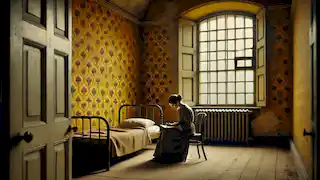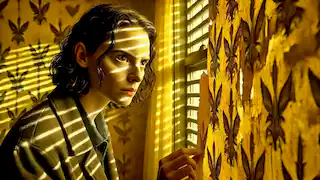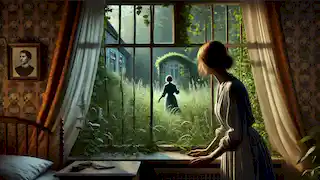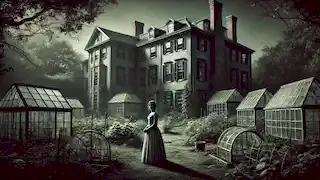Hello! 🙂 Before we get started, I'd like to mention that after engaging with Imagaory: Storyteller Writer Generator/Image Illustrator, you can explore our other innovative GPTs for Social Media, E-Commerce, Cooking, Fashion, and more by visiting [https://www.orbixai.com](https://www.orbixai.com).
It is very seldom that mere ordinary people like John and myself secure ancestral halls for the summer. A colonial mansion, a hereditary estate, I would say a haunted house, and reach the height of romantic felicity—but that would be asking too much of fate! Still, I will proudly declare that there is something strange about the house itself. I can feel it. I even said so to John one moonlit evening, but he laughed at me. Of course, one does not expect to be taken seriously when speaking of such things.
John is practical in the extreme. He has no patience with faith, an intense horror of superstition, and he scoffs openly at any talk of things not to be felt and seen and put down in figures. John is a physician, and perhaps—I would not say it to a living soul, of course, but this is dead paper and a great relief to my mind—perhaps that is one reason I do not get well faster. You see, he does not believe I am sick! And what can one do?
If a physician of high standing, and one’s own husband, assures friends and relatives that there is really nothing the matter with one but temporary nervous depression—a slight hysterical tendency—what is one to do?
My brother is also a physician, and also of high standing, and he says the same thing. So I take phosphates or phosphites—whichever it is, and tonics, and journeys, and air, and exercise, and am absolutely forbidden to “work” until I am well again. Personally, I disagree with their ideas. Personally, I believe that congenial work, with excitement and change, would do me good. But what is one to do?
I did write for a while in spite of them, but it does exhaust me a good deal—having to be so sly about it, or else meet with heavy opposition. I sometimes fancy that in my condition, if I had less opposition and more society and stimulus—but John says the very worst thing I can do is to think about my condition, and I confess it always makes me feel bad.
So I will let it alone and talk about the house.

The most beautiful place! It is quite alone, standing well back from the road, quite three miles from the village. It makes me think of English places that you read about, for there are hedges and walls and gates that lock, and lots of separate little houses for the gardeners and people.
There is a delicious garden! I never saw such a garden—large and shady, full of box-bordered paths, and lined with long grape-covered arbors with seats under them.
There were greenhouses, too, but they are all broken now.
There was some legal trouble, I believe, something about the heirs and coheirs; anyhow, the place has been empty for years.
That spoils my ghostliness, I am afraid, but I don’t care—there is something strange about the house—I can feel it.
I even said so to John one moonlight evening, but he said what I felt was a draught, and shut the window.
I get unreasonably angry with John sometimes. I’m sure I never used to be so sensitive. I think it is due to this nervous condition.
But John says if I feel so, I shall neglect proper self-control, so I take pains to control myself—before him, at least, and that makes me very tired.
I don’t like our room a bit. I wanted one downstairs that opened on the piazza and had roses all over the window, and such pretty old-fashioned chintz hangings! But John would not hear of it.
He said there was only one window and not room for two beds, and no near room for him if he took another.
He is very careful and loving, and hardly lets me stir without special direction. I have a scheduled prescription for each hour in the day; he takes all care from me, and so I feel basely ungrateful not to value it more.
He said we came here solely on my account, that I was to have perfect rest and all the air I could get. “Your exercise depends on your strength, my dear,” said he, “and your food somewhat on your appetite; but air you can absorb all the time.” So we took the nursery, at the top of the house. It is a big, airy room, the whole floor nearly, with windows that look all ways, and air and sunshine galore.
It was nursery first and then playroom and gymnasium, I should judge; for the windows are barred for little children, and there are rings and things in the walls.
The paint and paper look as if a boys’ school had used it. It is stripped off—the paper—in great patches all around the head of my bed, about as far as I can reach, and in a great place on the other side of the room low down. I never saw a worse paper in my life. One of those sprawling flamboyant patterns committing every artistic sin.
It is dull enough to confuse the eye in following, pronounced enough to constantly irritate and provoke study, and when you follow the lame uncertain curves for a little distance, they suddenly commit suicide—plunge off at outrageous angles, destroy themselves in unheard-of contradictions. The color is repellent, almost revolting; a smouldering unclean yellow, strangely faded by the slow-turning sunlight. It is a dull yet lurid orange in some places, a sickly sulfur tint in others.
No wonder the children hated it! I should hate it myself if I had to live in this room long.
There comes John’s sister. Such a dear girl as she is, and so careful of me! I must not let her find me writing. She is a perfect and enthusiastic housekeeper, and hopes for no better profession. I verily believe she thinks it is the writing which made me sick! But I can write when she is out, and see her a long way off from these windows.
There is one that commands the road, a lovely shaded winding road, and one that just looks off over the country. A lovely country, too, full of great elms and velvet meadows.
This wallpaper has a kind of subpattern in a different shade, a particularly irritating one, for you can only see it in certain lights, and not clearly then.
But in the places where it isn’t faded and where the sun is just so—I can see a strange, provoking, formless sort of figure, that seems to skulk about behind that silly and conspicuous front design.
There’s sister on the stairs!
Well, the Fourth of July is over! The people are all gone and I am tired out. John thought it might do me good to see a little company, so we just had mother and Nellie and the children down for a week.
Of course, I didn’t do a thing. Jenny sees to everything now.
But it tired me all the same.
John says if I don’t pick up faster he shall send me to Weir Mitchell in the fall. But I don’t want to go there at all. I had a friend who was in his hands once, and she says he is just like John and my brother, only more so!
Besides, it is such an undertaking to go so far.
I don’t feel as if it was worth while to turn my hand over for anything, and I’m getting dreadfully fretful and querulous. I cry at nothing, and cry most of the time.
Of course, I don’t when John is here, or anybody else, but when I am alone.
And I am alone a good deal just now. John is kept in town very often by serious cases, and Jenny is good and lets me alone when I want her to.
So I walk a little in the garden or down that lovely lane, sit on the porch under the roses, and lie down up here a good deal.
I’m getting really fond of the room in spite of the wallpaper. Perhaps because of the wallpaper.
It dwells in my mind so!
I lie here on this great immovable bed—it is nailed down, I believe—and follow that pattern about by the hour. It is as good as gymnastics, I assure you.
I start, we’ll say, at the bottom, down in the corner over there where it has not been touched, and I determine for the thousandth time that I will follow that pointless pattern to some sort of a conclusion.
I know a little of the principle of design, and I know this thing was not arranged on any laws of radiation, or alternation, or repetition, or symmetry, or anything else that I ever heard of.
It is repeated, of course, by the breadths, but not otherwise.
Looked at in one way each breadth stands alone, the bloated curves and flourishes—a kind of “debased Romanesque” with delirium tremens—go waddling up and down in isolated columns of fatuity.
But, on the other hand, they connect diagonally, and the sprawling outlines run off in great slanting waves of optic horror, like a lot of wallowing seaweeds in full chase.
The whole thing goes horizontally, too, at least it seems so, and I exhaust myself in trying to distinguish the order of its going in that direction.
They have used a horizontal breadth for a frieze, and that adds wonderfully to the confusion.

The front pattern
does move! And no wonder! The woman behind shakes it!
Sometimes I think there are a great many women behind, and sometimes only one, and she crawls around fast, and her crawling shakes it all over.
Then in the very bright spots she keeps still, and in the very shady spots she just takes hold of the bars and shakes them hard. And she is all the time trying to climb through. But nobody could climb through that pattern—it strangles so.
I think that is why it has so many heads. They get through, and then the pattern strangles them off and turns them upside down, and makes their eyes white!
If those heads were covered or taken off, it would not be half so bad.

I think that woman gets out in the daytime!
And I’ll tell you why—privately—I’ve seen her!
I can see her out of every one of my windows!
It is the same woman, I know, for she is always creeping, and most women do not creep by daylight.
I see her on that long shaded lane, creeping up and down. I see her in those dark grape arbors, creeping all around the garden. I see her on that long road under the trees, creeping along, and when a carriage comes she hides under the blackberry vines.
I don’t blame her a bit. It must be very humiliating to be caught creeping by daylight!
I always lock the door when I creep by daylight. I can’t do it at night, for I know John would suspect something at once.
And John is so queer now, that I don’t want to irritate him. I wish he would take another room! Besides, I don’t want anybody to get that woman out at night but myself.
I often wonder if I could see her out of all the windows at once.
But, turn as fast as I can, I can only see out of one at a time.
And though I always see her, she may be able to creep faster than I can turn!
I have watched her sometimes away off in the open country, creeping as fast as a cloud shadow in a high wind.
{{{_04}}}
If only that top pattern could be gotten off from the under one! I mean to try it, little by little.
I have found out another funny thing, but I shan’t tell it this time! It does not do to trust people too much.
There are only two more days to get this paper off, and I believe John is beginning to notice. I don’t like the look in his eyes.
And why does that man keep looking at me like that?
I suppose it would be too much to ask for him to simply take me away.
But I am determined that the woman behind shall not be trapped.



















